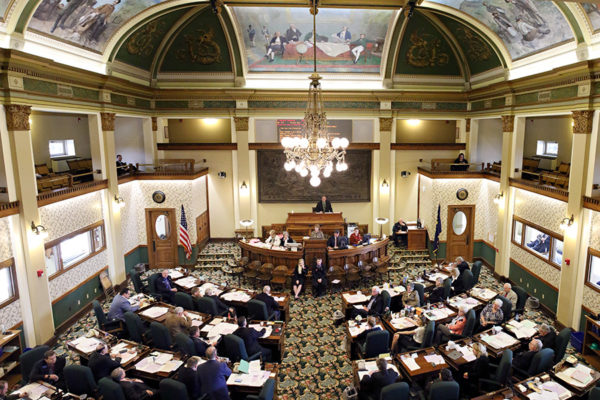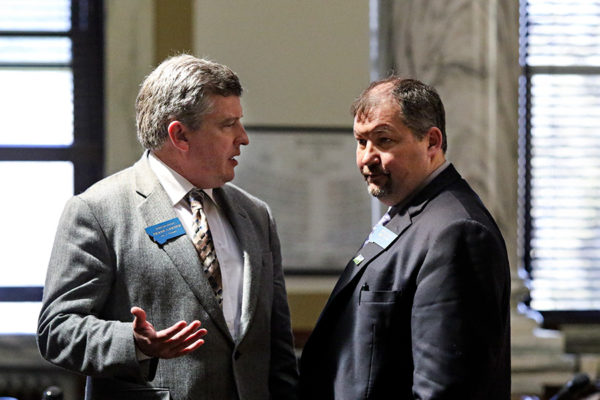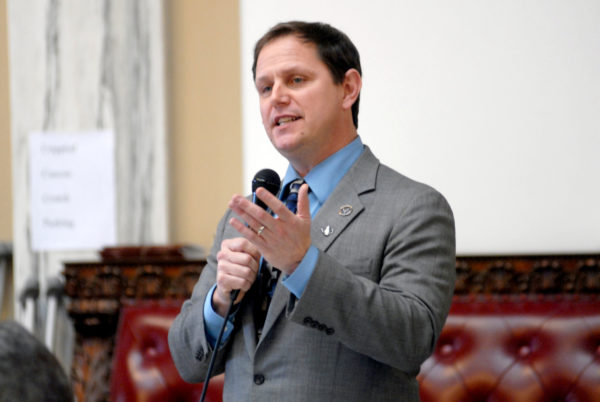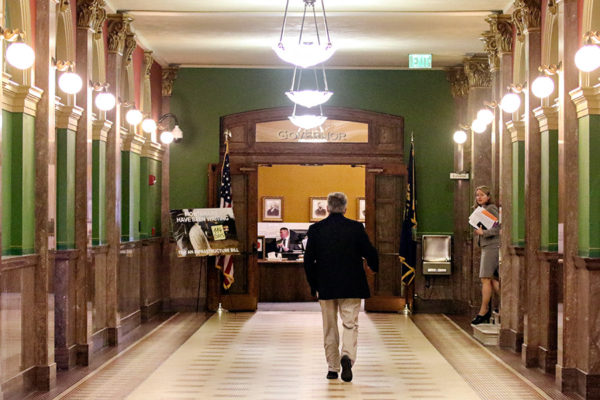When Brian Putnam entered the Republican primary to represent his legislative district in Evergreen and north Kalispell, he says he was motivated by the basic principle of public service — he figured he could help.
Specifically, he aimed to help improve walking paths to local schools, which constituents in House District 9 have complained about for years, likening them to an obstacle course strewn with traffic hazards and lacking adequate sidewalks.
A recent widower with grown children, Putnam works as an engineer in the Flathead Valley. He reasoned that his acumen for problem solving and his sudden lull in familial responsibilities made him a strong candidate for Montana’s citizen Legislature.
With no Democrats in the race, Putnam squared off against incumbent Republican Rep. David Dunn and, with workmanlike focus, launched a “Safe Paths to School” initiative while laying out plans to expand economic opportunities for Evergreen, an unincorporated community east of Kalispell that’s experiencing an uptick in growth.
By the time the June 2 primary results were tallied, Putnam emerged as the victor by fewer than 40 votes — a narrow triumph that has come under deeper scrutiny than Putnam anticipated.
Cheered by some as an indictment of the state Republican Party’s ultra-conservative wing and lambasted by others as a mutinous attempt by moderate lawmakers to fill their ranks with RINO (Republicans in Name Only) members, Putnam’s electoral victory in House District 9 is suddenly less about safer paths to school and more about which way to walk as a Republican.
“I disagreed with some of the bills that my opponent sponsored last session, but that’s about as far as it goes,” Putnam said. “As for my understanding of the political infighting of the Republican Party, that’s all kind of new to me. After I got into the race and started following it, all of a sudden I realized that I had stepped right in the middle of something.”

That “something” has been brewing for years. Unbeknownst to Putnam, his quest to furnish Evergreen with safe sidewalks led him into the thick of a political division that’s been widening for years, placing conservative party members at odds with more moderate Republicans, who have worked with Democrats during recent legislative sessions to broker deals on Medicaid expansion, education spending and campaign finance.
Signs of political faults within the Montana GOP began showing up six years ago, when a spate of Republican-versus-Republican skirmishes blossomed between the so-called “Conservative Solutions Caucus” and the GOP’s more conservative faction, dubbed the “38 Special,” so named for the number of GOP lawmakers who “adhere to Republican principles and limit government,” according to Rep. Theresa Manzella, who is credited with popularizing the term.
Although Republicans hold solid majorities in both chambers of the Montana Legislature, and the 2020 general election isn’t likely to change that, the winners of the GOP primaries help determine which wing of the party controls that majority — and, therefore, the 2021 Legislature itself.
As it happens, Putnam’s opponent identifies closely with the state’s far-right faction, and he was vocal in his endorsement of conservative candidates to challenge incumbent lawmakers this election cycle.
“I poked the bear,” Dunn said. “In my case it kind of painted a bull’s eye on my back. It’s been a humbling experience, and even though most of my party wanted me back, these middle-ground Republicans have a lot of support.”
Many of the races played out in deeply Republican districts, and the Flathead Valley was no exception — one senate district and six house districts featured contested Republican primary races, producing a mixed bag of results.

In Kalispell’s House District 7, Republican incumbent Frank Garner easily survived a challenge by Jerry O’Neil, a far-right conservative who represented House District 3 from 2011 to 2015 and served in the state senate before that.
Entering his fourth term, Garner, the former Kalispell police chief, has become a reliable member of Montana’s Conservative Solutions Caucus, having carried legislation to combat “dark money” in politics and introduce a gas tax, while supporting a compromise bill on Medicaid reform that aligned lawmakers on both sides of the aisle with Democratic Gov. Steve Bullock, who can’t run again because of term limits.
Garner has become familiar with his party’s infighting, which he hopes will be subdued when the Montana Legislature convenes in January, potentially under a Republican governor for the first time in 16 years as Republican nominee Greg Gianforte, Montana’s lone congressional delegate, faces Democrat Mike Cooney, who serves as Bullock’s lieutenant governor.
“My hope is that, now that we’re done with a difficult and divisive primary election season, we can come together and agree on as much as we can for the benefit of the state,” Garner said. “We’ve got to transition away from fighting among ourselves and move toward crafting solutions to the problems we all face.”
Garner said his deepest belief is firmly rooted in representing his district, not subscribing to a particular ideology.
“Given the choice between choosing what my party says and what is best for my district, I will choose my district every time,” Garner said. “So with that in mind, it’s time for us all to build consensus on what is in the best interest of our districts, and through that we’ll do what’s best for Montana.”
Asked whether he has any words of advice for newcomers like Putnam, Garner chuckles.
“There’s not a playbook that you pick up in the beginning about trying to coalesce a party,” he said. “With a little luck, it comes with experience.”

In other primary races in the Flathead Valley, conservative candidates prevailed. For example, Rep. Derek Skees held onto his seat in House District 11, despite facing a challenge from Dee Kirk-Boon, the former chair of the Flathead County Republican Committee who campaigned on her willingness to compromise.
Skees has been among the most vocal critics of Republican lawmakers who have joined forces with Democrats to pass bills he views as anathema to his party’s core. He’s been particularly critical of Llew Jones, R-Conrad, a leader of the Solutions Caucus who Skees believes will continue to undermine Republicans next session.
“Llew and crew will be up to their usual antics trying to make the government bigger, but hopefully with a Republican governor on the second floor they won’t need to cut so many deals with Democrats,” Skees said.
Even with the potential of a Republican governor in office, Skees said the infighting isn’t likely to disappear entirely, particularly as Solutions Caucus members discuss controversial measures like proposing a tax on Internet commerce.
“The polarization of things, the fights are just going to continue,” Skees said.
Former County Commissioner Gary Krueger, a Republican, said he’s grown tired of watching the same infighting roil Flathead politics, and places the blame on the hardline contingent.
“Nothing good has ever come out of the far-right wing of the Republican party,” Krueger said. “They have no achievements. All they do is put down those with any difference of opinion, organize smear campaigns and accuse us all of being RINOs. That wing of the party has become more of a fascist party than a Republican party.”
From Krueger’s vantage, the recent spate of contested primary races mirrors the election cycle four years ago, but this time it’s less clear who is mounting an offensive. Even as members of the “38 Special” declare victory following the 2020 Republican primary, members of the Solutions Caucus offer a different assessment.
“In reality, the Solutions Caucus performed well in the 2020 primary election and still is a power player in the Montana Legislature,” according to Jones, who along with Garner and six other Republican legislators authored a letter pledging that “problem solving Republicans aren’t going anywhere.”

“Despite the efforts of many far-right extremists to intimidate and threaten our members and supporters, there will be more than enough Conservative Solutions Caucus members to ensure problem solving legislators will have a powerful voice in the Montana Legislature,” according to the letter. “We will not be intimidated and we will not allow an extreme minority in the Republican Party to put their desires ahead of the needs of the people of Montana.”
In 2015, moderate Republicans splintered from their party to collaborate with Democrats on key issues, including expanding Medicaid and ratifying the contentious water compact with the Confederated Salish and Kootenai Tribes. Bullock and a majority of Democrats championed those same measures, which advanced solely due to support from Republican moderates, who went toe-to-toe with the party’s more ideological purists.
But with the possibility of a Republican governor in Helena next year, and with Republicans likely to remain in charge of the Legislature, it’s not yet clear whether the party will congeal in 2021, or on what issues.
In the wake of a pandemic, most lawmakers agree that when they arrive in Helena next year to balance a budget, revenues will be less than projected and they’ll have their work cut out for them.
That’s the kind of problem Putnam looks forward to rolling up his sleeves and working to fix. And it’s the kind of problem he thinks his constituents care about solving.
“My neighbors don’t care about party politics,” he said. “I consider myself an average citizen, and the average citizen doesn’t understand that there’s a rift in the Republican Party. There might be room for disagreement, but that’s good government.”
